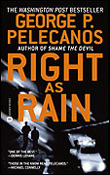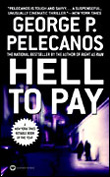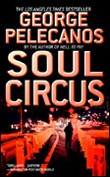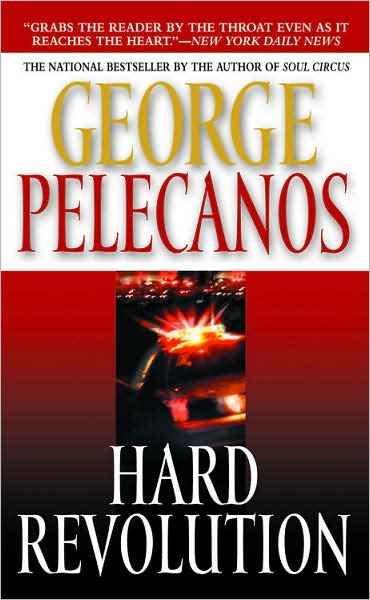Don’t be afraid of the raised lettering on the book jacket; a well-written crime-fiction novel deserves to be treated as high art. MAGNET’s Andrew Earles surveys the modern landscape of hard-boiled detective stories and tales of noir-colored underworlds.





Right As Rain / Hell To Pay / Soul Circus / Hard Revolution
Not to scoop the story of the century or anything, but the P.I. odd couple is nothing new to crime fiction. For decades, writers have used a P.I. to complete or accent another P.I. with no uniform outcome. Examples like Robert Crais’ Elvis Cole/Joe Pike duo and Robert B. Parker’s Spenser/Hawk pairing (started out strong, became a laugh riot) bring to mind the “I have too much of a conscience to throw you into that hay-baler, but my hulking, soulless man-mountain of a partner with his mechanical prosthetic arm doesn’t have the understanding that I do” formula. George Pelecanos‘ Strange/Quinn partnership is the something the crime-fiction duo so desperately needs: subtlety. Sure, no new ground is broken with the ex-cop with a dubious/troublesome past, but whining about the use of that back story is like criticizing indie rock for being rife with Caucasians. Get used to it.
As for Derek Strange, the man exudes confidence. He’s an ex-cop, successful, respected in the community, black, cocksure, smooth, old-fashioned in ways more positive than negative, altruistic and a terminal bachelor by choice (unlike Nick Stefanos). So he likes to visit an Asian jack-shack every once in a while; at least he’s not chasing the delirium tremors with a drink each morning or perpetually hunting for the slang meaning of his surname. So he’s not the stuff of genre reinvention. Show me what is. Pelecanos didn’t set out to turn the crime novel upside down with quirkiness or weird characterization (see Jonathan Lethem‘s Motherless Brooklyn for an enjoyable if not semi-precious example); he set out to write a new series and triumphed with a superior gloss on the source material. There is a maturation from the series that preceded this one (the D.C. Quartet), but as Pelecanos has stated in interviews, he was learning his craft in public.
Terry Quinn’s past is the crux of 2001’s Right As Rain, the introductory novel in the series. Quinn is not the nicest Irish badass in the world, and when he accidentally shoots a black cop, the cleanest acquittal in the world can’t iron out the tensions that await him back on the job, so the uniform gets traded for whatever he feels like wearing in a casual corner of the retail sector. Strange is a perfectionist and somewhat old-fashioned in his private detecting. With a realistic attitude toward youth culture and crime—realistic given his age and demographic—he’s charitable and critical at the same time. Sometimes he’s a little too “Bill Cosby vs. the baggy pants,” though this is balanced with surprising irreverence, restrained verbalizing and infrequent use of visceral options. In essence, he can take care of shit if the issue calls for it, but not without the requisite introspection. Much of Right As Rain is Strange investigating what put his future partner behind the counter at a used bookstore. Strange is the canvas on which Pelecanos tweaks his mastery of the challenged character. The ideals are put to the test; solutions satisfy and disturb at the same time.
The next novel, 2002’s Hell To Pay, is the finest read of the series. It predicts the Pelecanos of the past three or four years as much as it recalls his previous books. Even so, there is incendiary action and violence, plus some gnarly, often depressing, portrayals of underage prostitution. I couldn’t help but think of writer Andrew Vachss as I read Hell To Pay for the second time, though Strange and Quinn don’t deal with the offending pimp by use of a killer deaf-mute sidekick, elaborate torture device or the demolition of entire buildings. The three interwoven subplots are driven by an examination of modern-day gang activity; Quinn is now working out of Strange’s office and standing on the doormat of domesticity in an uncharacteristically meaningful relationship.
2003’s Soul Circus does well by its title. As with 2000’s Shame The Devil and 1995’s Down By The River Where The Dead Men Go, this series-closer is no barrel of monkeys. Terry Quinn is Mr. On The Verge more so than in the other two books, and the temper, self-destructiveness, catatonic drinking habits (he watches passing trains while getting blasted; sound familiar?) and his pesky past unhinge the man of Right As Rain and Hell To Pay. The plot of Soul Circus is even more gang-centric than that of Hell To Pay, believe it or not.
Presenting Strange first as a pre-teen in 1959, then as a rookie cop in 1968 having to deal with one of the worst long-form law-enforcement (and societal) nightmares of the 20th century, 2004’s Hard Revolution is an abrasive look at the first instance in modern times that Americans believed the world was ending. The combined awfulness of Dr. Martin Luther King’s assassination, the ’68 race riots, another Kennedy assassination and the Vietnam War? Poor economy, schmoor economy. More than 120 U.S. cities experienced rioting as a direct effect of King’s assassination, but along with Louisville, Chicago and Baltimore, D.C. was one of the worst. I came away from Hard Revolution with a newfound appreciation for what other cities had to cope with as a result of something that took place less than five miles from my home in Memphis.
The group of disparate kids and teenagers introduced in the first few chapters of Hard Revolution return, for the most part, in 1968 with a high ratio of damaged goods. The only Pelecanos work to approach a Vietnam novel, Hard Revolution is recent cultural and societal bleakness in its infancy. That’s why the book’s early chapters are a cursory look at 1959; there is a distinct then-and-now boundary in the sand with 1968. Many of the problems faced in Pelecanos novels set in post-Vietnam times can be traced back to that year. After following him as a green, African-American cop buried under the riots, readers will have a heightened respect for the Derek Strange of Right As Rain, Hell To Pay and Soul Circus.
Tomorrow’s installment: Pelecanos’ Shoedog and The Night Gardener.
On Monday, Pelecanos made MAGNET a mix tape; check it out here.
In 2001, Pelecanos interviewed ex-Dream Syndicate frontman Steve Wynn for us; read it here. They got along so well that four years later, they wrote a song together (“Cindy It Was Always You,” from Wynn’s…tick…tick…tick) and also performed once in a live setting, with Wynn providing instrumental backing to Pelecanos reading from 2006’s The Night Gardener. (Download “The Night Gardener”)
https://magnetmagazine.com/audio/TheNightGardener.mp3





